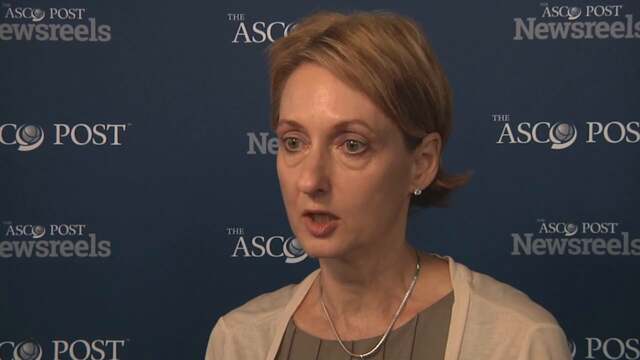Maura N. Dickler, MD, and Clifford A. Hudis, MD, on Results From the CALGB Alliance Trial on Hormone Receptor–Positive Advanced Breast Cancer
2015 ASCO Annual Meeting
Clifford A. Hudis, MD, and Maura N. Dickler, MD, of Memorial Sloan Kettering Cancer Center, discuss adding bevacizumab to letrozole as a first-line endocrine therapy for treatment of hormone receptor–positive advanced breast cancer (Abstract 501).
Christian Carrie, MD and Celestia S. Higano, MD
Christian Carrie, MD, of Centre Léon Bérard, and Celestia S. Higano, MD, of the University of Washington, discuss short hormonal therapy and radiotherapy as salvage treatment for relapse after radical prostatectomy (Abstract 5006).
Claus Garbe, MD
Claus Garbe, MD, of the University of Tuebingen, discusses the survival of sentinel lymph node biopsy–positive melanoma patients with and without complete lymph node dissection (Abstract LBA9002).
Jedd Wolchok, MD, PhD, and Anthony J. Olszanski, RPh, MD
Anthony J. Olszanski, RPh, MD, of Fox Chase Cancer Center, and Jedd Wolchok, MD, PhD, of Memorial Sloan Kettering Cancer Center, discuss therapies for treatment-naive patients with advanced melanoma (Abstract LBA1).
Areej El-Jawahri, MD, and Eric Roeland, MD, FAAHPM
Eric Roeland, MD, FAAHPM, of the University of California, San Diego Moores Cancer Center, and Areej El-Jawahri, MD, of Massachusetts General Hospital, discuss two important studies on early palliative care and the use of anamorelin in advanced NSCLC with cachexia.
Laurie H. Sehn, MD, MPH
Laurie Helen Sehn, MD, MPH, of the British Columbia Cancer Agency, discusses a first-ever finding on obinutuzumab and bendamustine in the setting of rituximab-refractory indolent non-Hodgkin lymphoma (Abstract LBA8502).





